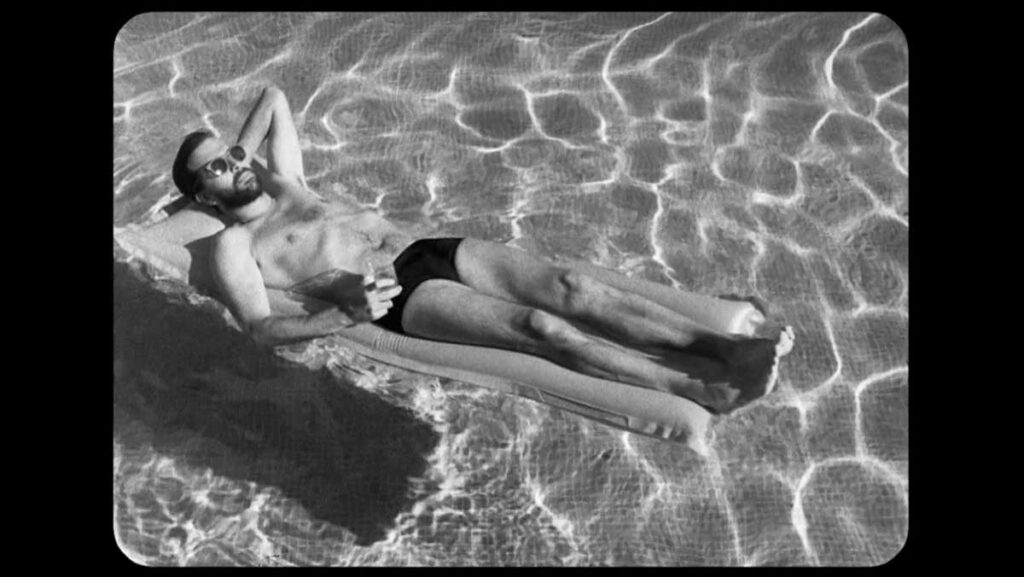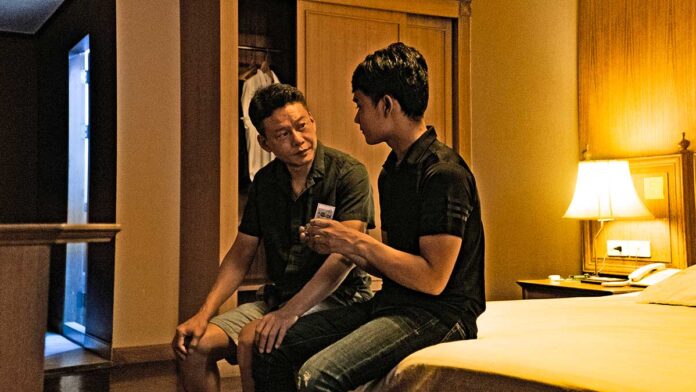The Lightbox Film Center, home to Philadelphia’s repertory and experimental cinema, is reopening August 27 in its University of the Arts space at Gershman Hall, 401 S. Broad Street. (The Center moved to the new location in February 2020, screening three films before the pandemic forced it to go virtual). The reopening kicks off the Lightbox Film Center’s Fall calendar, which include four thought-provoking films with queer interest or LGBTQ content.
Out gay filmmaker Tsai Ming-liang has been making distinctive “slow cinema” for nearly thirty years. Working with his muse, Lee Kang-sheng, Tsai uses long takes and little dialogue to create great emotions. His eleventh feature, “Days” (screening August 28 at 8:00 pm) is “intentionally unsubtitled” and depicts two men, Kang (Lee Kang-seng) and Non (Anong Houngheungsy), as they go about their days. Kang undergoes therapy for his injured neck; Non prepares food. Barely a word is spoken. They eventually meet up in a hotel room where Non massages Kang, before they go their separate ways. Tsai makes not just the encounter — a stunning half-hour long sequence that brims with eroticism — but the entire film, tremendously moving. The long takes and ambient sound contribute to the palpable sense of longing, loneliness, isolation, and connection that makes Tsai’s work so spellbinding. This film is a good introduction to his style for the uninitiated, as well as catnip for his ardent followers.

Armando Rovira’s fabulous 2018 experimental drama, “Letters to Paul Morrissey,” (screening September 10 at 7:00 pm), has four fans of the Warhol filmmaker/collaborator (“Flesh,” “Heat, “Trash,” etc.) “write” letters to Paul Morrissey, to express their connection to him and his work. The first letter is by Udo Strauss (Xavi Sáez), who questions faith and enters a monastery to “find himself.” An impressive sequence has Udo stapling pages from the bible to his nude body. The second letter is by Warhol/Morrissey superstar Joe D’Allesandro. He talks poignantly and poetically about addiction as images show scenes from a skate park. The third letter is by Olena Wood (María Fajula), an aging actress who appeared in “Chelsea Girls” and combats her loneliness by hiring a young man, Steve (Esteban Torres) — a relationship that echoes the Sylvia Miles/Joe D’Allesandro romance from Morrissey’s “Heat.” (The poster from that film is on display in several scenes.) The last two letters are director Saida Benzal’s near-silent gothic entry, and one featuring Hiroko Tanaka (Almar G. Soto) as a young woman who hears screeching sounds, meeting a woman with a sleep disorder. “Letters to Paul Morrissey” is artily filmed in black and white (and on 16mm) with many arresting images, such as the shadows of rain streaking a woman’s face like tears, or a dazzling burst of sunlight entering an open window. Rovira’s film is a lovely homage to Morrissey, capturing the spirit, if not the essence of his work.
Gay Argentine writer/director Matías Piñeiro’s latest film, “Isabella” (screening September 17 at 7:00 pm), continues the filmmaker’s exploration of identity and performance. Mariel (María Villar) is an actress looking to be cast as Isabella in “Measure for Measure.” She asks another actress, Luciana (Agustina Muñoz), to help her achieve her goal. Piñeiro has the women recite and repeat dialogue from the play which magnifies the meaning of their words — especially as they are seen in different circumstances and time periods. “Isabella” takes a prismatic approach to its storytelling, using a series of striking and playful visuals of each woman’s life. The approach may be a bit obtuse, but there are many intriguing moments.
Then there is “Arrebato” aka “Rapture” (tentatively scheduled to screen October 9). Directed by Iván Zulueta (his only feature), this 1979 oddity has filmmaker José Sirgado (Eusebio Poncela) receiving a package from Pedro (Will More), a filmmaker he met twice when he dated Pedro’s cousin. The film flashes back to those encounters, which throb with homoeroticism. (One scene has the two men in various stages of undress sharing a bed). But what transpires exactly is unclear because José is a heroin addict, and “Arrebato” unspools like a fever dream. The drug-induced haze will either mesmerize viewers or bore them. Zulueta lets viewers make the connections between addiction and Cinemania as the film folds in on itself. But there are some very vivid scenes — from a fascinating early sequence of José in his apartment forgetting he ran a bath, to José and Pedro playing with slime, and a scene where José and his girlfriend Ana (Cecilia Roth) snort up cocaine they spilled on the carpet. The film’s final sequence is also stunning. And listen up for legendary Spanish filmmaker Pedro Almodóvar, whose voice is dubbed for the character of Gloria. Fun fact: Zulueta designed the posters for Almodóvar’s early films. Another fun fact: the three leads all appeared in the 1997 queer Argentine film, “Martín (Hache).” A cult film for sure, “Arrebato” is guaranteed to polarize viewers.
For tickets and more information, visit the Lightbox Film Center’s website, https://lightboxfilmcenter.org/.
